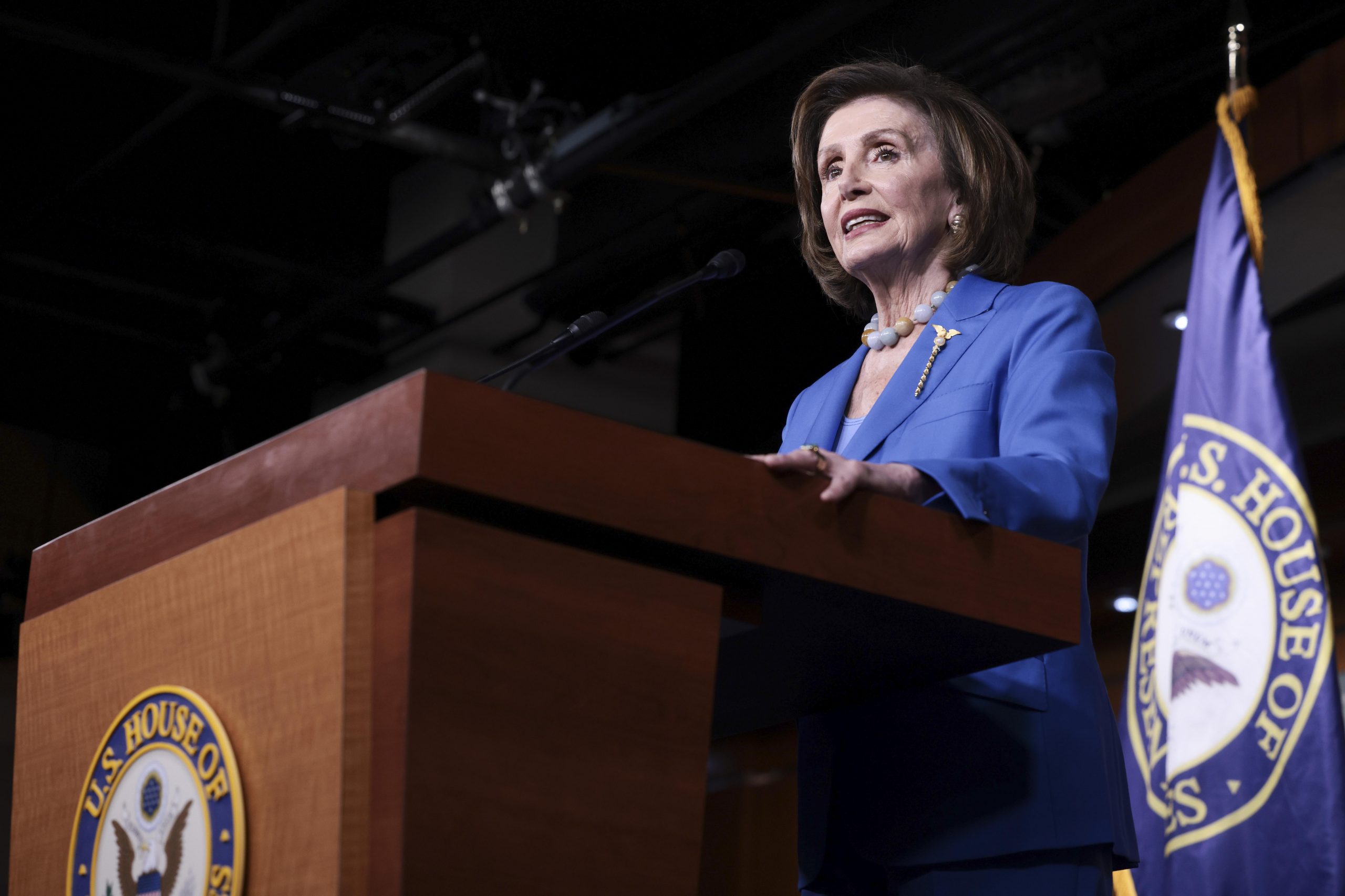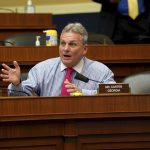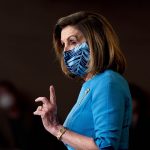Top Democrats are continuing to talk past each other as they openly spar over the scope of President Joe Biden’s social agenda ahead of a critical three-week stretch in the negotiations.
Speaker Nancy Pelosi and other Democrats have indicated they hope to reach a deal on the massive social safety net bill by the end of the month. But if the dueling messages Tuesday are any indication, Democrats remain miles apart on an agreement to address everything from child care and paid family leave to a massive health care expansion to climate change, as the party grapples with which priorities in the bill should stay, which should go and which should be trimmed.
“We have some important decisions to make in the next few days so that we can proceed,” Pelosi told reporters in a press conference Tuesday. “At $3.5 trillion we were doing everything well. … We’re still talking about a couple of trillion dollars but it’s much less.”
Pelosi indicated Tuesday that Democrats are eyeing a double-barrel approach: trimming both the number of priorities in their social spending package as well as cutting back on the length certain programs would be funded. Democratic leaders hope the two-prong plan can dramatically cut the package from its initial price tag of $3.5 trillion to a spending target Senate moderates are comfortable supporting.
But top progressives didn’t hide their exasperation, both with the pace of the talks and what little they have heard from two key negotiators — Sens. Joe Manchin (D-W.Va.) and Kyrsten Sinema (D-Ariz.).
“We are prepared to negotiate, we are prepared to compromise, but we’re not going to negotiate with ourselves,” Senate Budget Chair Bernie Sanders (I-Vt.) told reporters in a press call Tuesday.
Democrats are increasingly anxious about the enormous obstacles to completing the package in the coming weeks, with pressure building to deliver a key Biden priority amid his lagging approval ratings. Privately, some Democrats fear that the sprawling bill could spill over into the December of hell, when the party will also need to pass a trillion-dollar government spending bill and avoid a debt crisis.
Pelosi has said she aims to pass Biden’s infrastructure and domestic policy bill by Oct. 31 — when a temporary authorization for highway and transit programs expire. But some liberal lawmakers are already suggesting that Congress could once again punt that deadline.
“We all want to work as quickly as we can. And obviously, the short-term surface transportation extension can always be extended if we have to,” Congressional Progressive Caucus Chair Pramila Jayapal (D-Wash.) said.
House Majority Leader Steny Hoyer on Tuesday voiced confidence that Democrats could finish both priorities by late October, but that it would take cooperation across the party.
"[It’s] everybody, not just one person. It takes a lot of responsibility to make this happen," Hoyer said.
House Democrats left Washington nearly two weeks ago — after a tense week of negotiations that ultimately fizzled without a deal — with a directive from Biden to narrow their ambitions for the $3.5 trillion plan. Biden privately told Democrats the bill would likely need to be in the $2 trillion range.
The path to a smaller bill has led to party soul-searching as Democrats debate exactly which Biden priorities to include — and for how long.
Progressives have been vocal about passing the most sprawling package possible, even if it requires ending funding for those programs earlier and risking a future Congress cutting them off.
But many others, including House chairs and members of leadership, have argued that Democrats should focus on just a handful of programs, which they can fund for years and cement Biden’s legacy.
Pelosi on Tuesday suggested that the party’s approach would be a combination of the two, representing yet another internal policy debate that Democrats will need to settle before month’s end to pass Biden’s package.
"If there are fewer dollars to spend, there are choices to be made," Pelosi told reporters.
The House returned briefly Tuesday to clear a short-term debt limit fix that will give Congress some breathing room on the debt cliff at least until early December. The Senate first passed the bill last week after a scramble to round up Republican votes.
The debt ceiling crisis consumed the Senate last week, with the only real talk of reconciliation coming when Sanders and Manchin hosted dueling press conferences attacking each other’s positions on Democrats’ social spending plan.
And while the debt ceiling vote meant House members were thrown back together during the chamber’s October recess week, it also brought into clear view just how scattered the negotiations over Democrats’ social infrastructure bill remains.
Pelosi triggered a wave of confusion early Tuesday when she indicated Democrats would likely not only have to make hard choices about which priorities to cut entirely from their social spending bill but would also look at limiting the number of years some programs are funded in order to cut down on overall costs.
Pelosi had privately emphasized the plan to drop some programs entirely from the package in conversations over the last week, saying “the theme among members is to do fewer things better.” But several White House officials have been offering the competing approach to end programs earlier, including in conversations with progressives in the Capitol.
And Pelosi herself seemed to undercut her initial message during the press conference Tuesday, telling reporters that Democrats would “be cutting back on the years” for some programs.
Progressive leaders, who continue to insist on a bill that includes an array of family, health and climate provisions — even if those sunset in the coming years — seized on Pelosi’s latter remarks during their press call Tuesday.
“We would reduce the number of years because the universality of benefits and the immediacy of benefits are absolutely critical. And that, frankly, is more important to us than having it for the entire 10 years,” Jayapal said. “We were happy to see the speaker say something similar in her press conference today.”
Some Democrats privately said they hoped that since Pelosi was back from an overseas trip, the negotiations with Democratic leaders, liberals, Manchin and Sinema could resume in earnest. But many were still skeptical that the key party members could reach a deal by the desired Oct. 31 deadline.
Pelosi is focusing her negotiations in three main areas: climate change; family issues including child care and paid family leave; and health care — specifically House Democratic leaders desire to strengthen Obamacare and extend Medicaid to red states that have refused to expand the program.
But the party’s two factions still remain far apart on some key areas even within those three buckets.
Manchin has spoken against certain climate provisions while Sinema has rebuffed progressives on efforts to lower prescription drug costs. Sanders, meanwhile, continues to buck House Democratic leaders on health care, saying his push to expand Medicare to cover vision, hearing and dental benefits is a must.
But privately, Democratic negotiators say there’s no way to have both Sanders’ Medicare push — of which the dental expansion in particular is very costly — along with efforts to shore up Obamacare and Medicaid, especially in a bill that will be dramatically lower in cost.
“The truth of the matter is these predictions should have been included in the original Medicare bill, they were not,” Sanders said. "This to me is not negotiable.”





















